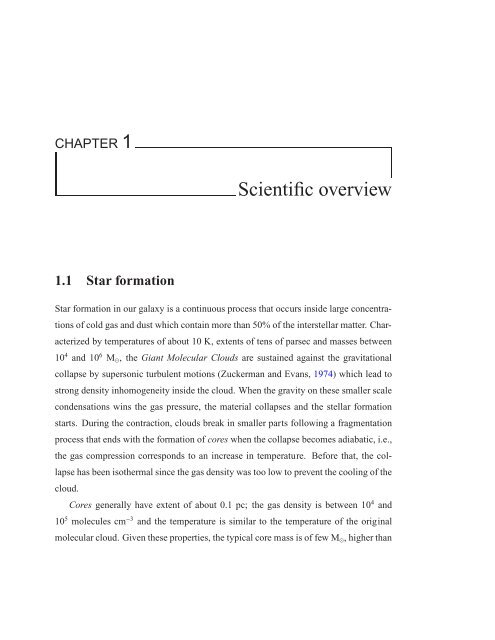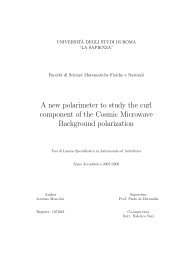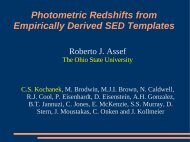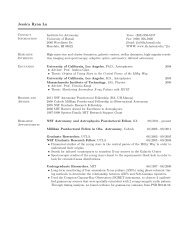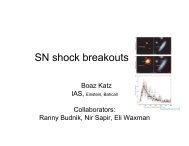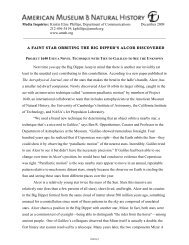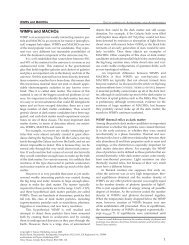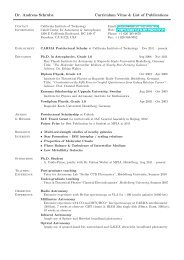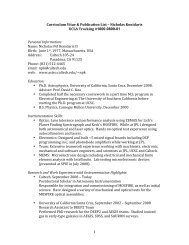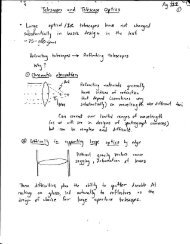- Page 1: Università degli Studi di Milano F
- Page 5 and 6: CONTENTS I Introduction 1 1 Scienti
- Page 7 and 8: CONTENTS v 4.5 Comparison with prev
- Page 9: Part I Introduction
- Page 13 and 14: 1.1 Star formation 5 • in the cen
- Page 15 and 16: 1.1 Star formation 7 the mid-infrar
- Page 17 and 18: 1.2 Disk structure in the pre-main
- Page 19 and 20: 1.2 Disk structure in the pre-main
- Page 21 and 22: 1.2 Disk structure in the pre-main
- Page 23 and 24: 1.3 Grain growth and planetary form
- Page 25 and 26: 1.3 Grain growth and planetary form
- Page 27 and 28: 1.4 Outline and aims of the thesis
- Page 29: 1.4 Outline and aims of the thesis
- Page 32 and 33: 24 Introduction to interferometry b
- Page 34 and 35: 26 Introduction to interferometry 2
- Page 36 and 37: 28 Introduction to interferometry t
- Page 38 and 39: 30 Introduction to interferometry t
- Page 40 and 41: 32 Introduction to interferometry F
- Page 42 and 43: 34 Introduction to interferometry 2
- Page 44 and 45: 36 Introduction to interferometry w
- Page 47: Part II Dust in the inner disk
- Page 50 and 51: 42 The shape of the inner rim in pr
- Page 52 and 53: 44 The shape of the inner rim in pr
- Page 54 and 55: 46 The shape of the inner rim in pr
- Page 56 and 57: 48 The shape of the inner rim in pr
- Page 58 and 59: 50 The shape of the inner rim in pr
- Page 60 and 61:
52 The shape of the inner rim in pr
- Page 62 and 63:
54 The shape of the inner rim in pr
- Page 64 and 65:
56 The shape of the inner rim in pr
- Page 66 and 67:
58 The shape of the inner rim in pr
- Page 68 and 69:
60 The shape of the inner rim in pr
- Page 70 and 71:
62 The shape of the inner rim in pr
- Page 72 and 73:
64 The shape of the inner rim in pr
- Page 75 and 76:
CHAPTER 4 Large dust grains in the
- Page 77 and 78:
4.2 Target stars and observations 6
- Page 79 and 80:
4.3 Model description 71 Figure 4.1
- Page 81 and 82:
4.3 Model description 73 densityρg
- Page 83 and 84:
4.4 Comparison with the observation
- Page 85 and 86:
4.4 Comparison with the observation
- Page 87 and 88:
4.5 Comparison with previous analys
- Page 89 and 90:
4.6 Discussion 81 by the relation
- Page 91 and 92:
4.6 Discussion 83 the inner rim has
- Page 93 and 94:
4.7 Summary and conclusions 85 4.7
- Page 95 and 96:
IN05 model Eisner et al. (2004) out
- Page 97 and 98:
V 2 1 0.8 0.6 0.4 0.2 0 0 50 100 15
- Page 99 and 100:
V 2 1 0.8 0.6 0.4 0.2 0 0 50 100 15
- Page 101:
V 2 1 0.8 0.6 0.4 0.2 0 0 50 100 15
- Page 104 and 105:
96 More on the “puffed-up” inne
- Page 106 and 107:
98 More on the “puffed-up” inne
- Page 108 and 109:
100 More on the “puffed-up” inn
- Page 110 and 111:
102 More on the “puffed-up” inn
- Page 113:
Part III Gas in the inner disk
- Page 116 and 117:
108 AMBER/VLTI spectroscopy of HD 1
- Page 118 and 119:
110 AMBER/VLTI spectroscopy of HD 1
- Page 120 and 121:
112 AMBER/VLTI spectroscopy of HD 1
- Page 122 and 123:
114 AMBER/VLTI spectroscopy of HD 1
- Page 124 and 125:
116 AMBER/VLTI spectroscopy of HD 1
- Page 127 and 128:
CHAPTER 7 The keplerian disk of HD
- Page 129 and 130:
7.2 Observations and data reduction
- Page 131 and 132:
7.3 Observational results 123 λ (m
- Page 133 and 134:
7.3 Observational results 125 Figur
- Page 135 and 136:
7.3 Observational results 127 Figur
- Page 137 and 138:
7.3 Observational results 129 Figur
- Page 139 and 140:
7.4 Disk Models 131 kν, through th
- Page 141 and 142:
7.4 Disk Models 133 7.4.2 CO emissi
- Page 143 and 144:
7.5 Results 135 Figure 7.7: Maps of
- Page 145 and 146:
7.5 Results 137 Figure 7.8: Compari
- Page 147 and 148:
7.6 Discussion 139 Rout 700 600 500
- Page 149 and 150:
7.6 Discussion 141 Finally, a more
- Page 151 and 152:
7.7 Summary and conclusions 143 A c
- Page 153 and 154:
7.7 Summary and conclusions 145 Fig
- Page 155:
7.7 Summary and conclusions 147 In
- Page 159 and 160:
CHAPTER 8 Summary and Conclusions T
- Page 161 and 162:
8.1 The inner disk 153 consistent m
- Page 163:
8.3 Conclusions 155 to explain scat
- Page 166 and 167:
158 Future developments interact wi
- Page 168 and 169:
160 Future developments 2004; Najit
- Page 170 and 171:
162 Future developments tions of th
- Page 172 and 173:
164 Future developments Figure 9.2:
- Page 174 and 175:
166 Future developments cases shown
- Page 176 and 177:
Figure 9.4: Simulated observations
- Page 179 and 180:
BIBLIOGRAPHY [2005] Acke B., van de
- Page 181 and 182:
BIBLIOGRAPHY 173 [2006] Dominik C.,
- Page 183 and 184:
BIBLIOGRAPHY 175 [2006] Ilgner M.,
- Page 185 and 186:
BIBLIOGRAPHY 177 [1994] Pollack J.B
- Page 187:
Ringraziamenti Al termine di questi


